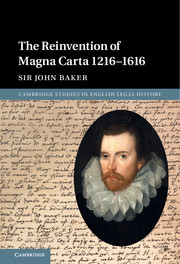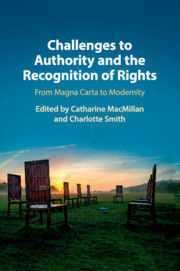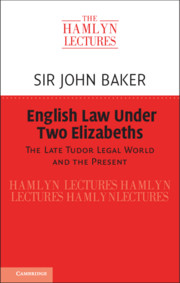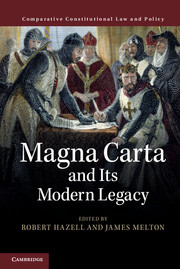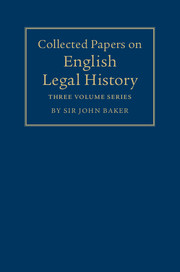The Reinvention of Magna Carta 1216–1616
$188.00 (C)
Part of Cambridge Studies in English Legal History
- Author: John Baker, University of Cambridge
- Date Published: January 2017
- availability: Available
- format: Hardback
- isbn: 9781107187054
$
188.00
(C)
Hardback
Other available formats:
Paperback, eBook
Looking for an examination copy?
This title is not currently available for examination. However, if you are interested in the title for your course we can consider offering an examination copy. To register your interest please contact [email protected] providing details of the course you are teaching.
-
This new account of the influence of Magna Carta on the development of English public law is based largely on unpublished manuscripts. The story was discontinuous. Between the fourteenth and sixteenth centuries the charter was practically a spent force. Late-medieval law lectures gave no hint of its later importance, and even in the 1550s a commentary on Magna Carta by William Fleetwood was still cast in the late-medieval mould. Constitutional issues rarely surfaced in the courts. But a new impetus was given to chapter 29 in 1581 by the 'Puritan' barrister Robert Snagge, and by the speeches and tracts of his colleagues, and by 1587 it was being exploited by lawyers in a variety of contexts. Edward Coke seized on the new learning at once. He made extensive claims for chapter 29 while at the bar, linking it with habeas corpus, and then as a judge (1606–16) he deployed it with effect in challenging encroachments on the common law. The book ends in 1616 with the lectures of Francis Ashley, summarising the new learning, and (a few weeks later) Coke's dismissal for defending too vigorously the liberty of the subject under the common law.
Read more- Provides a new history of early modern constitutional law, concentrating on the protection of personal liberties through recourse to Magna Carta
- Shows how constitutional developments occurred in practice, looking at real cases and highlighting the importance of unpublished legal texts
- Includes new biographical and bibliographical material, which will be of interest to historians both of historical thought and of legal literature
Reviews & endorsements
'Baker's comprehensive and reflective study makes an impressive contribution to our understanding of Magna Carta in the medieval and early modern world.' Sean McGlynn, Journal of British Studies
Customer reviews
17th Oct 2024 by UName-456522
A REFRESHING NEW LOOK AT THE SUSTAINABILITY OF OUR BRILLIANT MAGNA CARTA An appreciation by Elizabeth Robson Taylor of Richmond Green Chambers and Phillip Taylor MBE, Head of Chambers, Reviews Editor, “The Barrister”, and Mediator This exceptional paperback caught our eye when we looked at the dates it covers: 1216 to 1616. And, at a time when we have only just celebrated 800 years of its sealing, so what happened in the first 400 years? The answer lies in this brilliantly written work from Professor Sir John Baker based on his lectures. This book is published by Cambridge University Press (CUP) under the series “Cambridge Studies in English Legal History”. As the publisher states, “Magna Carta was largely ineffective for practical purposes between the fourteenth century and the sixteenth century”. The reason being that late-medieval law lectures gave “no hint of its later importance” hence a need for reinvention possibly! And there, of course, lies the problem: the “taking for granted” of this charter which does not figure that high on the British agenda whilst it’s revered in the United States of America and other prominent jurisdictions! Perhaps one of the problems rests with the fact that it is “primarily a legal story and the sources are not written in English” as Baker suggests. Using a reality test, this formidable and learned work is not for the timid or the uninitiated in matters of the sealing of “Magna Carta” however uninterested the British public really are. Baker gives a flavour of the content, writing, for instance, that “a treatise by William Fleetwood (c.1558) was still in the traditional mould, but the lectures of the 'Puritan' barrister and MP Robert Snagge in 1581, and the speeches and tracts of his colleagues, advocated new uses for it”. And then there are the long years, described as “centuries of oblivion”, until in 1587 there were eight reported cases in which chapter 29 was cited. The celebrated leading jurist of the time, Sir Edward Coke, made extensive claims for chapter 29, linking it with habeas corpus, and then as a judge (1606-16) he deployed it with effect in challenging “encroachments on the common law and the liberty of the subject”. This book ends in 1616 with the lectures of Francis Ashley, summarising the effects of the new learning, and then Coke's dismissal for pushing his case too hard. A challenging new account. Thank you, Sir John. The paperback book was published on 11th January 2017.
Review was not posted due to profanity
×Product details
- Date Published: January 2017
- format: Hardback
- isbn: 9781107187054
- length: 622 pages
- dimensions: 235 x 159 x 40 mm
- weight: 1.03kg
- availability: Available
Table of Contents
1. The legal character of Magna Carta
2. Chapter 29 in the fourteenth century
3. Magna Carta in the Inns of Court, 1340–1540
4. Personal liberty and the Church
5. Royal prerogative and common law under Elizabeth I
6. William Fleetwood and Magna Carta
7. The resurgence of Chapter 29 after 1580
8. Magna Carta and the rule of law, 1592–1606
9. Sir Edward Coke and Magna Carta, 1606–15
10. 'A year consecrate to justice':
1616
11. Myth and reality.-
General Resources
Find resources associated with this title
Type Name Unlocked * Format Size Showing of
This title is supported by one or more locked resources. Access to locked resources is granted exclusively by Cambridge University Press to instructors whose faculty status has been verified. To gain access to locked resources, instructors should sign in to or register for a Cambridge user account.
Please use locked resources responsibly and exercise your professional discretion when choosing how you share these materials with your students. Other instructors may wish to use locked resources for assessment purposes and their usefulness is undermined when the source files (for example, solution manuals or test banks) are shared online or via social networks.
Supplementary resources are subject to copyright. Instructors are permitted to view, print or download these resources for use in their teaching, but may not change them or use them for commercial gain.
If you are having problems accessing these resources please contact [email protected].
Sorry, this resource is locked
Please register or sign in to request access. If you are having problems accessing these resources please email [email protected]
Register Sign in» Proceed
You are now leaving the Cambridge University Press website. Your eBook purchase and download will be completed by our partner www.ebooks.com. Please see the permission section of the www.ebooks.com catalogue page for details of the print & copy limits on our eBooks.
Continue ×Are you sure you want to delete your account?
This cannot be undone.
Thank you for your feedback which will help us improve our service.
If you requested a response, we will make sure to get back to you shortly.
×
